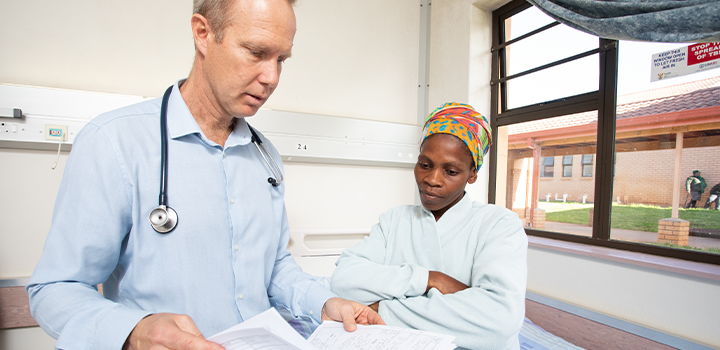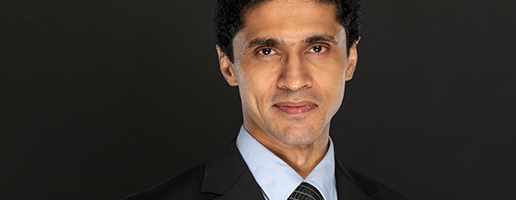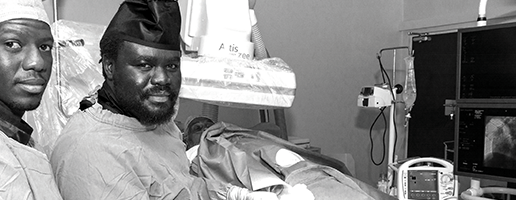Zithulele Training and Research Centre: a model of rural healthcare research

Dr Karl le Roux received a Discovery Foundation Rural Institutional Award in 2019 to strengthen the capacity of the Zithulele Training and Research Centre in training healthcare workers and doing research that benefits rural medicine in South Africa.
Four close friends who graduated from the University of Cape Town’s (UCT’s) medical campus within a year of each other shared the ideal of building a more equal society. They’ve since bonded further to create one of the country’s most innovative, deep rural district hospitals: Zithulele Hospital in the Eastern Cape.
Drs Ben and Taryn Gaunt, and Drs Karl and Sally le Roux married before arriving at Zithulele Hospital in 2005 and 2006 respectively. With a varied and complementary skill set and open minds, they showed a willingness to get their hands dirty. The 146-bed hospital is snagged in a dusty web of rutted roads atop one of the rolling coastal hills near Coffee Bay, 99 km from Mthatha.
They immediately ran into the endemic challenges of many deep rural district hospitals: medicine and equipment shortages, low staff morale, a severe shortage of experience, lack of skills and supervision, and scant accommodation.
Over the past 15 years, they have overcome nearly every obstacle, attracting and knitting together a large multidisciplinary team of doctors and nurses, and received several national awards. They’ve set up funding trusts, a local school, nutrition projects and a fast-expanding research and training centre to facilitate rural research and train healthcare workers.
Neonatal mortality rates have plummeted, HIV and tuberculosis (TB) care is exemplary with incidence and death rates down, clinics run smoothly and the quality of some specific services (like eye care) outstrip that of several regional Eastern Cape hospitals.
Zithulele Training and Research Centre
They’re a shining example of how ‘stickability’, or a person’s staying power, attracts like-minded healthcare professionals, eager to contribute and learn.The Zithulele Training and Research Centre will now also boost the research capacity of this on-site rural facility and significantly upgrade its digital, technical and physical infrastructure. This takes their initiative of three years earlier to source three funding streams and custom-build a research and training facility to the next level. With an upstairs training hall seating up to 120 people, a boardroom, two offices, kitchen and leisure space, it also sleeps 30 people downstairs. It’s uniquely linked to the hospital’s paediatric and maternity wards by an upper-level walkway.
The funding of support staff and data capturers, as well as laptops, overhead projectors, cabling and networking, voice recorders, cellphones and sound-proof room dividers opens the door wider for visiting experts and trainers to conduct seminars and workshops for local and surrounding hospital and clinic staff.
Ever evolving and more focused on TB eradication
Dr Karl le Roux manages the centre and works on several research projects focusing on maternal and child health issues. “We’re excited at the impact the centre’s training, workshops and supervision will have on healthcare workers in the Eastern Cape,” he says.
During a working visit to Princeton University, Dr Le Roux met a TB expert and professor of global health from Harvard, Prof Salmaan Keshavjee. He is a colleague of the world-renowned Dr Paul Farmer, the medical anthropologist, physician and author of the seminal book In the Company of the Poor.
“[Prof Keshavjee] described a more comprehensive approach to TB than we have in South Africa and different ways of treating and preventing TB, including latent TB infection,” Dr Le Roux explains.
“We’d like to use our centre as a base for an ambitious rural TB eradication programme, which we can then document to benefit rural areas in South Africa and other parts of the developing world. We’re trying to get researchers out from Harvard, UCT, Stellenbosch and the Medical Research Council to put together a rigorous research protocol, using a health-systems approach so we can get on top of TB in our area, and ultimately our country.”
The Zithulele clinical team has nurtured excellent ongoing relationships with all these institutions. With the Centre’s new training and global digital connection capacity, it will provide an ideal base.
Measured, practical steps
"Tactically, the team took the exact right initial steps, addressing the constriction of the lifeblood of any deep rural hospital: financial support and accommodation. Their umbrella foundation Jabulani Rural Health Foundation is a broad-based non-governmental organisation (NGO) that, besides supporting the hospital, now provides pre-school education, pays translators and builds and manages accommodation.
Dr Karl le Roux’s wife, Dr Sally le Roux, is not only a doctor but also teaches children in the area. “She initially divided her time between her paediatric HIV clinics and homeschooling our kids. We saw a whole bunch of local children attending schools that weren’t equipping them for life. Some NGOs set up a school and tried to source teachers, but nobody applied. So, Sally volunteered in 2016, and is now the ‘headmistress’ and studying to become a qualified teacher through a distance-learning course,” he says. The Zithulele Independent School teaches 48 children from Grade R through to Grade 4, and Sally still puts in four hours of HIV paediatric work at the hospital each week.
The original clinical quartet came to Zithulele out of a sense of calling to work in rural medicine. That has sustained them through difficult times and their ongoing research will benefit rural medicine in South Africa and further afield.
This article appeared in the 2019 Discovery Foundation Awards book and has been edited for length.
The images on this page were taken leading up to the 2019 Discovery Foundation Awards before COVID-19 reached South Africa. Stay healthy. Stay home.
About the Discovery Foundation
Since 2006, the Discovery Foundation has invested over R256 million in grants to support academic medicine through research, development and training medical specialists in South Africa.
The Discovery Foundation is an independent trust with a clear focus – to strengthen the healthcare system – by making sure that more people have access to specialised healthcare services. Each year, the Discovery Foundation gives five different awards to outstanding individual and institutional awardees in the public healthcare sector.
Related articles

“Mentoring keen young doctors really energises me” – Dr David Stead
Dr David Stead received a 2019 Rural Institutional Award from the Discovery Foundation to support and train district clinicians in central Eastern Cape. He plans to put in place a rural training and support programme for doctors over three years.

Top cardiothoracic surgeons teach Port Elizabeth based surgeons new skills
Dr Jithan Koshy, with the support of the Discovery Foundation, has invited two experienced cardiothoracic surgeons to teach cardiac surgeons at the Livingstone Tertiary Hospital and Port Elizabeth General Hospital how to do heart surgery on children.

Cardiology chief gives Eastern Cape doctors the skills to fight heart disease
In 2019, Dr Khulile Moeketsi received a Discovery Foundation Rural Institutional Award to help implement a project to train medical doctors in rural hospitals in basic cardiology skills and to give bedside teaching on cardiology clinical signs and symptoms.